MANAGING PLANTATION COMPANIES
IN PROFITABLE TIMES
Teo Leng
It would be good for estate owners and managers to emulate of our former Minister of Primary Industries, Datuk Lim Keng Yaik, who was happy when there were problems, but worried deeply when things were going well.
With palm oil and palm kernel prices being high for the past few years, there is good reason to worry. While it is easy to make profits now, the high prices also hide problems that can emerge when prices go down.
Today plantations have extra funds due to windfall profits. Therefore it is timely to reflect on what can be done to see that plantations will stay profitable even when prices go down.
- Plantations
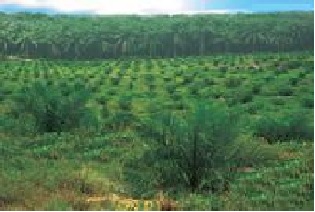
- Planting Materials
Owners should be more discriminating in their choice of the planting materials. They should check the data methodically and choose only from the best source/s to suit their location, soils and terrains.
Some owners may argue that the costs of seeds from certain suppliers are very high, and look for bargains. But a good palm can be worth RM 1,000 or more in its life time, and a mediocre palm perhaps ten percent less, so it is wise to go only for the best.
- Nursery Management
Owners know that seedlings should get rich top-soil, mulching, adequate fertilizer, and regular watering. But this is also a time when culling can be done ruthlessly. There is an old saying that says “When in doubt, throw it out.” Now it is wise to change that to: “When there is a shadow of a doubt, throw it out.” Only the most vigorous seedlings should get planted. Then there will be fewer inferior palms to bring down the yield.
I would add that the low average yield per hectare in Indonesia is partly due to the planting of seed material of low standards, or in some smallholdings, unselected material. The poor standard of nursery management, inadequate culling, and over-aged seedlings in many plantations have reduced performance further. As a result they mask the high performance of the better plantations, which exceeds the levels reached by most of the plantations in Malaysia, both in yield of FFB as well as OER. These plantations select their planting material judiciously and their nursery practices are kept at very high standards.
- Ways to Improve Palm Population
A plantation company I know is planting vacant areas including removing abandoned buildings and planting the site. When added together, the planted area is increased considerably.
In the immature areas, weak palms are removed early and replaced by vigorous supplies.
In mature areas, owners should remove unproductive palms early. Sometimes this work is overlooked due to the pressure of everyday work, shortage of labour, or there is no budget. With the good times now it is timely to spend money on this work.
- Pure LCC covers
Pure LCC covers can add vigour to the palms and help in their precocity. A simple calculation can show that a slight increase in yield will repay the owner many times more than the costs he has to bear to get pure covers. Now only a few companies are insisting on pure covers for their immature areas.
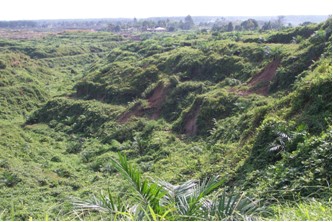
- Improvement on Terrain Management
This is an opportune time to repair platforms and terraces, harvesting bridges and steps, so the harvesters can work fast and improve their output. Supervisors can get to the slopes and far boundaries easily. In the less efficient estates, it is almost certain that one can find missed bunches or self-sown seedlings in areas that are hard to get to.
- Fertilizer Application
When prices were low many estates had cut back on dosage. Now is the time to see where areas need higher dosages and make up for the shortfalls.
Many estates think they have enough supervision, while the opposite is true. The estates should increase the intensity of supervision to make sure that application is done with the right dosage, placement and timing. The extra costs are far outweighed by the value of improved yield when fertilizer application is done well.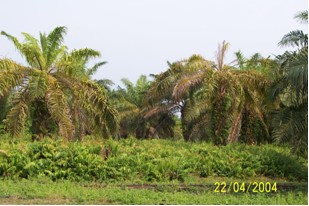
In Borneo, timing can be a problem as the rainy season can lead to excessive leaching, and stocks do not reach the estates on time. There is also a shortage of labour. In this case, aerial fertilizer application should be re-considered, and trials done again. This may be the answer to good application relating to timeliness, even distribution, and security of fertilizer stocks.
- Water Management
It is likely that an estate can get higher yield if the water management is improved. Owners should consider hiring consultants who are experts who can show them how it can be done. The cost can be only a fraction of the windfall profits, but the benefit can last for many years.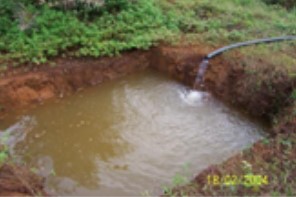
- Research & Development
Companies should allocate more money for R&D in order to find breakthroughs.
Breakthroughs have boosted productivity. We can see the examples such as the development of the DxP crosses, and the introduction of the pollinating insects. It is time again to look far and wide for expertise, even if they are on contract basis with defined projects with a limited time span. Then the companies are not burdened with overheads after the purpose of the project is over. Examples for research projects include finding ways to cut bunch more easily so that it does not need so much energy and skill. Then the costs of harvesting can be reduced. There may be a way to contain the ripe bunches on the trees so that when the bunches fall, the loose fruits do not scatter. United Plantations is usually credited with the discovery of the harvesting pole and sickle, and saved harvesters from having to climb palms to cut bunches and sometimes fall and break their backs. This innovation was made decades ago, yet no further improvement has been seen since them on this aspect. Containing bunches may be the next breakthrough, but it needs money for new ways to be found.
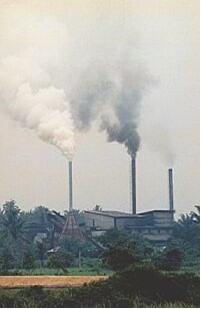
- Engineering
In the mills the extraction rates in Peninsula Malaysia are low compared to those in Sabah, Sarawak and Indonesia.
Many reasons have been given, and no doubt some of them are true. Milling is an art. For example, at the sterilizer station the operator who is well-trained and alert will know how to vary the sterilizing cycle so that the fruits are sterilized adequately and not overcooked which will result in losses of oil in the sterilizer condensate. Similarly at the press station the operator with skill and experience, and with enthusiasm, can make a difference to the OER.
Engineers will appreciate having money allocated for research, that can reduce the losses of oil and preserve the quality of oil and kernel.
When the large plantation companies were acquired by Malaysians, much of the research work that was done abroad had to be stopped. Unfortunately the new owners did not take up the pace in Malaysia. Now innovations tend to come from equipment suppliers including CB Industries on continuous sterilizing methods, and Enersave Sdn Berhad which have the “Zero Waste” system that converts effluent into heat, fertiliser, electricity and re-cycled water.
- Marketing
Companies can benefit by improving the skills of their planters in bunch census and crop forecasting. The loss can be great in times of volatile prices when the crop is over-estimated and sold forward on the strength of bunch census numbers. Usually amongst managers there are different degrees of accuracy, but in general it can be said that the managers or assistants who are accurate are those who are attentive to details and are often in the field.
Owners should get the executives to know more about the competition, such as soya oil and sunflower oil, and make visits to the producers of competing oils to understand the supply chains of competing oils in the market, and their perceived advantages over palm oil.
We need to also understand the role of the global retailers (such as WalMart, TESCO etc) and their strengths in controlling the value of oils in the food products sold off their shelves – and the nature of \their control of the edible oils supply chains. Only then can plantation companies formulate appropriate marketing and retailing strategies.
Now is the time when companies can afford to give exposure and training, and yet show good profits to shareholders.
D. Downstream activities
Several plantation companies have refineries and they will help to buffer the effect of the volatility of prices. For owners of plantations, it is timely to look for refinery businesses so that they are not just price-takers, but can enjoy some of the benefits of value-adding for the CPO and palm kernel that they are producing. Refineries are mostly integrated today, and many that are not will want partners who are in plantations.
In the consuming countries, the governments are encouraging local refining and manufacturing, and many companies have gone overseas and followed these requirements. They have first studied the business environment and the suitability of local partners.
A potential investor should consider using consultants to do the study accompanied  by executives of the company who can learn from the experience.
by executives of the company who can learn from the experience.
E. End-products and consumer goods
Many companies wish to expand their businesses further downstream. They choose to go step by step and start with semi-finished products, and eventually produce consumer goods. In this case the business is unlike plantations, for it requires large inputs in promotion and advertising, and a strong back-up on market research. Now is the time to look into it and get expert advice, so that the plantations business which is profitable now can be extended to include consumer products which if popular, can be sold at a premium.
F. Improving Management
It is true to say that the supply of good managers with experience has not kept pace with the expansion of plantations. There is little time for most assistants to develop well before they are made managers. Very few dismissals have occurred compared to the days when there were many planters and few estates. Then only the most efficient had survived
Today the demands on a planter have changed. He has much more to do, and his work gets technical. The recruitment of managers has to be systematic preferably with visits to universities and checking with them on the best students and persuade them join the estates, mills, marketing, research or finance. For a long time now estates are not attracting the best people due to many choices of employment in urban centers. The remoteness, frequent transfers and hardships are not compensated by a meaningful premium in pay which once their predecessors had enjoyed. Plantation jobs do not have the same glamour any more. Plantation companies have cut back on expenses during times when prices were low. The effects of cutbacks in training have reduced efficiency.
Once again owners should send more executives to courses in universities, and visit other companies to see new ways of work. Plans should be made for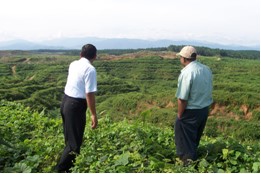 executives to take turns to visit MPOB officers, and buy books from their shops. Similarly the executives can gain from visits to MPOPC see the broad picture. Planters should visit the refineries whose managers will explain the quality of oil that they want and seldom get.
executives to take turns to visit MPOB officers, and buy books from their shops. Similarly the executives can gain from visits to MPOPC see the broad picture. Planters should visit the refineries whose managers will explain the quality of oil that they want and seldom get.
These are some of the destinations I can mention, and one can go further by saying that planters and mill managers should visit the best companies in Indonesia to see how they can get 28 tonnes average per hectare and over 24% oil extraction. Planters can improve when they are given the chance to travel and see with their own eyes.
On the plantations and mills, companies should pay a big bonus for executives who pass their professional examinations. In the industry we have the Incorporated Society of Planters, and owners should insist that their planters are members, and that they should take the examinations. Some companies have internal examinations to assess the progress and ability of their executives.
Lastly, on management, the profitable times now provide an opportunity to retrench people who are clearly not performing, and not suited to plantation life. They can bring down the performance and profits of the business. A program should be made to pay them off, and pay them well. When the economy is good, the people affected will have a fair chance of getting other jobs, which perhaps will suit them more.
The exercise will demonstrate to all that their prospects are based on performance.
Exceptional performance should be rewarded in a big way, and should be seen to be done. Executives have suffered pay cuts when prices were low. Now they wait to see if in good times their pay will be boosted markedly to reflect the companies’ good fortune. When this is not done, then the credibility of top management is gone.
Good managers will leave to join the companies that pay more, and average managers will not work after five. Managing plantations is largely about managing people. But on weekends many planters can be seen around Subang Jaya where they have parked their families. For them, the companies have cut back on expenses and rejected their applications to repaint the bungalows, refuse to change their furniture, and make them share gardeners. Such notions about savings are de-motivating, and the managers do not do their best and the estate loses more money than what the owners had saved. There are of course rare exceptions, and in those companies the outstanding managers do not leave. The estates enjoy continued good management.
In the mills the engineer recruitment programs have slackened over the years. A renewed effort needs to be made so that there are trainees who can be apprenticed with sufficient time and experience to take over when their seniors retire or take charge of new mills. Now as our engineers are lost to Indonesia where they get high pay, there is even more reason to step up the intake of trainees in a concerted way among owners.
For now there is no equivalent society for engineers such as the ISP which set and invigilates examinations for planters. Owners can now consider contributing funds to set up a similar body which can set examinations for engineers in the industry. The examinations will complement the government examinations for steam certificates. The subjects will concentrate on management practices, mill and equipment innovations, productivity, profitability, and man-management.
Similarly for marketing, there is no marketing body for the industry. As a result our marketing ability is not strong in the downstream aspect – note that an undue amount of marketing and trading is done in foreign countries such as Singapore, which has a strong and vibrant marketing organisation including the Singapore Institute of Marketing.
G. Audit
Plantations can spend a little of their windfall income money to assess how they fare against the competition and best practices. This can be done by engaging consultants who are capable of analyzing their performance and making recommendations to improve.
Unfortunately, consultants are usually engaged by the best companies, while the companies that need consultants the most, are usually the last to realize the value of consultants.
As a third party, a competent consultant firm can do an audit that will bring gains to the owners. They do more than what external auditors usually do, and bring ideas they have seen done successfully somewhere else, and they can suggest ways of improvement that the owners and managers could not see because of the pressure of everyday work .
H. Conclusion
In conclusion, I would recommend strongly that plantation companies should use their profits prudently for the long-term growth of the business.
They should invest now in order to withstand the times that lie ahead, and remain in profit when prices are low.
